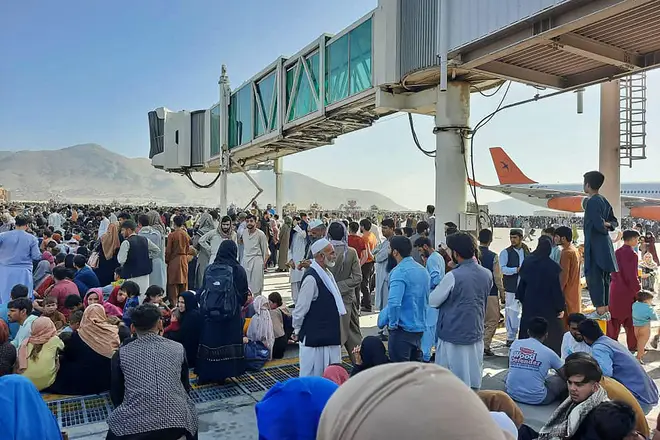
Iain Dale 7pm - 10pm
30 August 2021, 23:35

The new Taliban regime in Afghanistan faces international pressure to respect human rights and provide safe passage for those who wish to escape its rule following the passage of a UN Security Council resolution.
The council adopted a resolution in New York - with Russia and China abstaining rather than wielding their vetoes - in what the UK hopes is a step towards a unified international response.
Ahead of the US deadline for the withdrawal of its forces on Tuesday and the end of the airborne evacuation, the resolution called on the Taliban to give safe passage to people who wish to leave Afghanistan.
Read more: Final US evacuation flight departs Kabul airport - Pentagon
Read more: Foreign Sec calls for international support to help at-risk Afghans escape the Taliban
The UK's ambassador to the UN, Dame Barbara Woodward, said: "We have been clear that the Taliban must adhere to their own stated commitments to ensure safe passage beyond August 31."
The Security Council also made clear that Afghanistan must never again become a "safe haven" for international terrorists, Dame Barbara said, as she stressed "a co-ordinated approach will be vital to counter any extremist threat emanating from Afghanistan".
The humanitarian situation also needs to be urgently addressed - with complete access for UN agencies and aid organisations - and the progress made on human rights in the 20 years since the US-led coalition became involved in Afghanistan must also be protected, she said.
"Today's resolution is an important step towards a unified international response to the situation in Afghanistan," Dame Barbara said.
"We will continue to build on this to ensure the council holds the Taliban accountable on its commitments.
"The Taliban will be judged by the international community on the basis of their actions on the ground, not their words."

UK troops and diplomats arrive home after 20-year Afghanistan campaign
Although Russia and China did not back the resolution, their decisions not to block it will be a relief in the West.
The UK hopes Russia and China could wield some influence over the new Afghan government on issues including countering terrorism and the trade in narcotics, preventing a refugee crisis and further economic collapse.
Dame Barbara said there was a shared goal that Afghanistan should not be "in a position to disrupt its neighbours".
"There is a lot of shared ground for us to work from although, in this case, Russia and China abstained rather than voted for the resolution."
Read more: Ten members of one Afghan family killed in US drone strike - reports
Read more: Head of armed forces 'gaslighting Afghan women' with Taliban comments, Tory MP insists
Prime Minister Boris Johnson said the UN Security Council resolution "makes clear that the international community stands with Afghans".
He added: "There can be no return to repression or terror. We will push as one voice for safe passage, humanitarian access & respect for human rights."

Maajid Nawaz argues furore around Pen Farthing distracting from issues
Earlier, on a day of intense diplomatic activity, Foreign Secretary Dominic Raab set out his hopes for international alliances to be formed to exert a "moderating influence" on the Taliban.
Mr Raab's intervention came at a US-convened meeting for the G7 group of industrialised democracies: the UK, US, Canada, Japan, Germany, France and Italy, along with representatives from the EU, Turkey, Qatar and the Nato alliance.
The focus on ensuring safe passage for eligible Afghans comes with uncertainty about how many might seek to reach the UK and how they can hope to make the journey following the end of the airlift.
Foreign Office Minister James Cleverly said it was impossible to estimate how many people eligible to come to the UK had been left behind after evacuation flights finished.
Around 15,000 people had been evacuated from Afghanistan in a "herculean" effort, Mr Cleverly said, but Labour has claimed around 5,000 may have been left behind and ministers have faced criticism over the UK response.